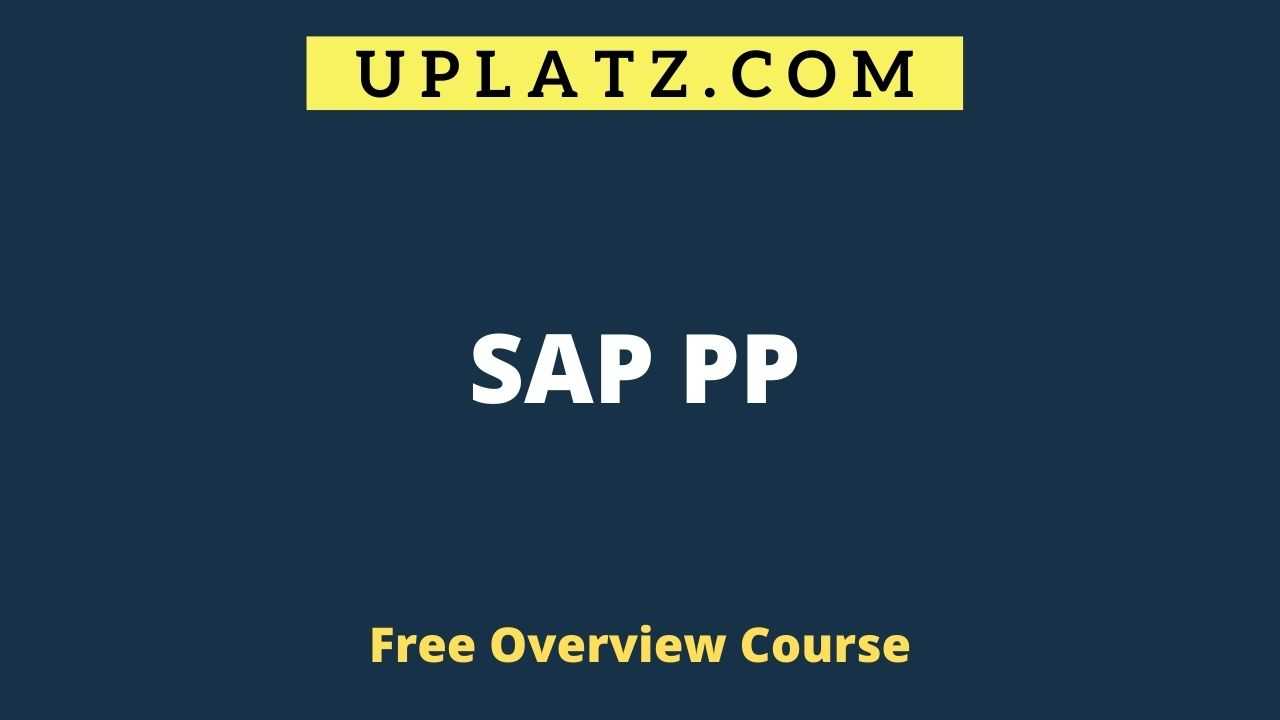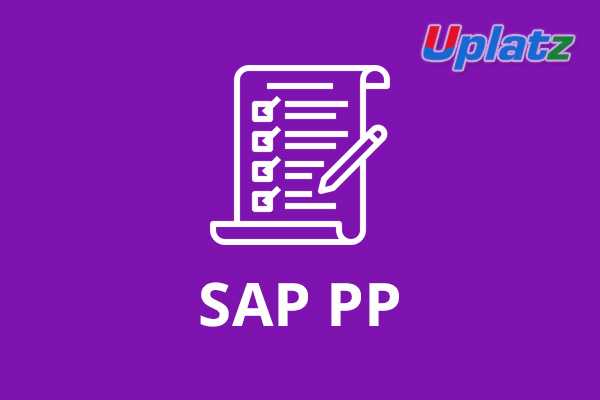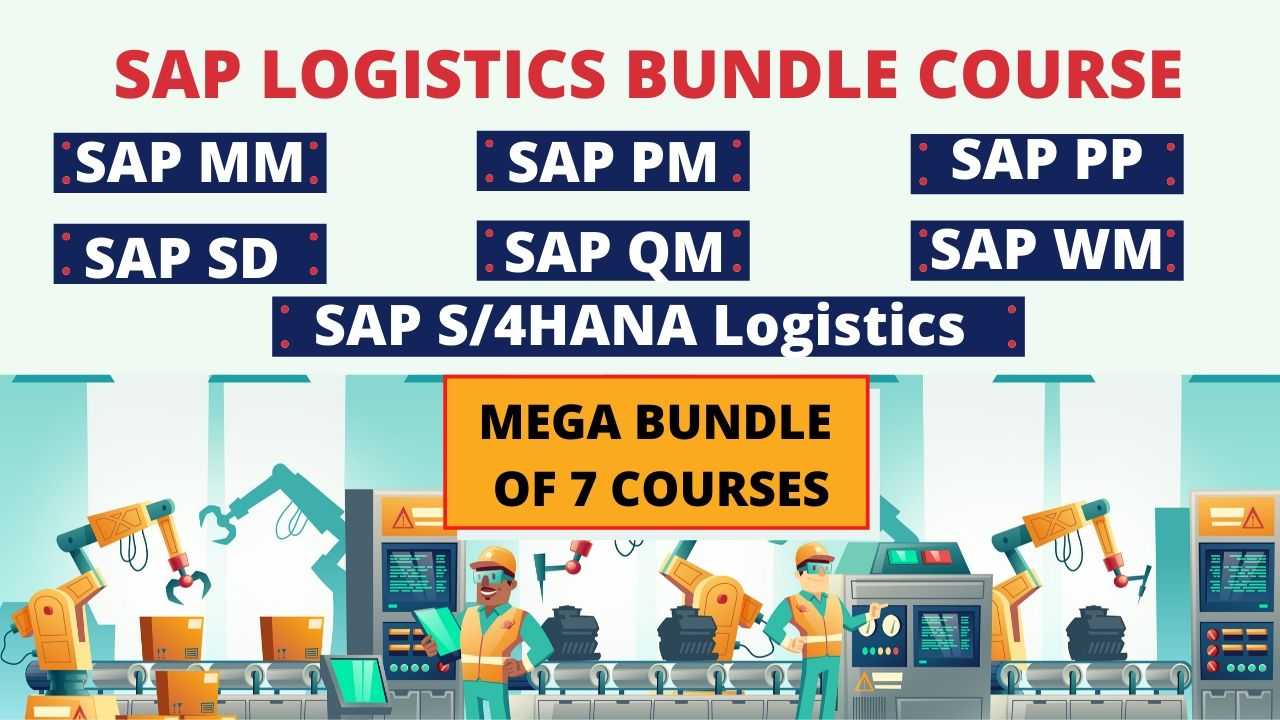Overview Course - SAP PP
Streamline production processes with SAP PP - Optimize planning, control, execution for efficient manufacturing, on-time delivery and resources usage. View Course Curriculum
Price Match Guarantee
Full Lifetime Access
Access on any Device
Technical Support
Secure Checkout
Course Completion Certificate
View Course Curriculum
Price Match Guarantee
Full Lifetime Access
Access on any Device
Technical Support
Secure Checkout
Course Completion Certificate
 34% Started a new career
Enroll Now
34% Started a new career
Enroll Now
-
 68% Got a pay increase and promotion
68% Got a pay increase and promotion
Students also bought -
-

- SAP PP (Production Planning)
- 10 Hours
- GBP 29
- 1218 Learners
-

- SAP PP (Production Planning)
- 10 Hours
- GBP 29
- 1218 Learners
-

- Bundle Course - SAP Logistics (PM - PP - MM - QM - WM - SD - S4HANA Logistics)
- 200 Hours
- GBP 22
- 1692 Learners

This is an Overview Course on SAP PP by Uplatz while the complete detailed-level SAP PP course is available at
https://training.uplatz.com/online-it-course.php?id=sap-pp-production-planning-6
SAP PP (Production Planning) is a core module of the SAP ERP (Enterprise Resource Planning) system that focuses on the planning, execution, and optimization of production processes within an organization. It facilitates effective production planning and control, ensuring that production resources are utilized efficiently to meet customer demands and achieve business goals. SAP PP empowers organizations to achieve efficient and effective production processes, leading to improved productivity, reduced lead times, and better customer satisfaction.
Key Components of SAP PP:
1. Master Data: SAP PP relies on various master data elements such as materials, work centers, routings, BOMs (Bill of Materials), and production versions. These data elements provide the foundation for production planning and execution.
2. Material Requirement Planning (MRP): MRP is a vital function of SAP PP that calculates the material requirements for production based on customer demands, safety stock, and lead times. It ensures that the right materials are available at the right time for production.
3. Bill of Materials (BOM): The BOM is a hierarchical structure that lists all components and subassemblies required to produce a finished product. It defines the material relationships and quantities needed for production.
4. Routing: Routing specifies the sequence of operations, work centers, and resources involved in the production process. It helps in determining the most efficient production path.
5. Work Centers: Work centers represent physical or logical resources where production activities take place. They can include machines, labor groups, tools, and other resources.
6. Production Orders: Production orders are the core of SAP PP and represent planned or actual production activities. They provide information about the production quantity, schedule, and associated costs.
7. Capacity Planning: Capacity planning ensures that there are enough resources available to meet production demands. It helps optimize production schedules and avoid capacity bottlenecks.
8. Production Planning Profiles: These profiles contain parameters for materials that are used during the planning process. They define the planning strategies, lot-sizing procedures, and other settings.
9. Shop Floor Control: SAP PP allows for real-time monitoring and control of production activities on the shop floor. It enables users to manage work centers, update production statuses, and record actual production quantities.
10. Material Staging: Material staging involves ensuring that the required materials are available at the production line before the start of production to avoid delays.
11. Repetitive Manufacturing: This functionality is used for industries with high-volume and continuous production processes. It allows the production of the same product repeatedly without the need for individual production orders.
Benefits of SAP PP:
1. Improved Production Planning: SAP PP provides a comprehensive view of the production process, allowing for better planning and optimization of resources.
2. Efficient Material Management: MRP in SAP PP ensures that the right materials are available at the right time, reducing inventory costs and stockouts.
3. Enhanced Visibility and Control: With real-time monitoring and reporting capabilities, SAP PP offers better visibility into production activities and enables proactive decision-making.
4. Streamlined Production Execution: Production orders and work center management streamline the execution of production activities and minimize disruptions.
5. Integration with other SAP Modules: SAP PP seamlessly integrates with other SAP modules like SAP MM (Materials Management) and SAP SD (Sales and Distribution), enabling end-to-end business processes.
In the full SAP PP training you’ll learn Introduction to Production designing, Master information, Master designing, Production Orders, distinct producing, Repetitive producing, Integration points of Production designing with alternative modules, reportage & Tools, and more, with sensible exercises and live examples.
The SAP PP course will also help you prepare for SAP PP certification exam as well for SAP PP consultant and end user job interviews. As production planning is an essential part of a company’s supply chain, SAP Production Planning certified professionals are in great demand.
Course/Topic - SAP PP overview - all lectures
-
Lecture 6 - Material Master - part 2
-
Lecture 30 - Creating Order Types and Production Scheduling Profile
-
Lecture 19 - Batch Management in PP
The objective of this SAP Production Planning (SAP PP) course is to provide learners with a comprehensive understanding of SAP PP’s functionalities for effective production and manufacturing management. Participants will gain practical experience with key processes such as demand planning, material requirements planning (MRP), production orders, and capacity planning. The course covers essential topics as well as techniques for optimizing production scheduling and inventory management. By the end of the course, learners will be proficient in utilizing SAP PP to streamline production processes, improve planning accuracy, and enhance overall operational efficiency within their organization.
-Key Course Objectives-
a) Understand the role and importance of SAP PP in production planning and manufacturing processes within organizations.
b) Learn about the architecture and components of SAP PP, including master data, production orders, bills of material (BOM), and work centers.
c) Gain proficiency in configuring SAP PP for production planning, scheduling, and execution.
d) Explore SAP PP's capabilities for material requirements planning (MRP), capacity planning, and shop floor control.
e) Understand integration scenarios of SAP PP with other SAP modules such as SAP MM (Materials Management) and SAP SD (Sales and Distribution).
f) Learn about production processes in SAP PP, including repetitive manufacturing, discrete manufacturing, and process industries.
g) Develop skills in using SAP PP for production order management, production confirmation, and goods movement.
h) Discuss best practices for implementing and optimizing SAP PP, including lean manufacturing principles and continuous improvement.
i) Analyze real-world case studies and examples of successful SAP PP implementations across various industries.
j) Prepare for potential SAP PP certification exams (if applicable) by covering exam topics and practice scenarios.
These objectives aim to provide participants with a comprehensive understanding of SAP PP and practical skills to effectively plan, schedule, and execute production processes using SAP's integrated solution.
This SAP PP Overview training course is designed for mastering the SAP PPmodules. The course content details theproduction and manufacturing processesand able to implement while working on any project.
This SAP PP Overview training course is meant for clearing theSAP Certified Application Associate- Production Planning and Manufacturing with SAP ERP 6.0 EhP7exam.
The SAP PP is a SAP module which is designed to integrate the departments involved in production and manufacturing. The SAP PPis used to build business plans with manufacturing ability to create production schedules for completed goods.
In SAP PP Overview Course module details PP overview, architecture, lean manufacturing and master data. The SAP PP Overview comprises production order functionality and other core concepts.
The SAP PP Overview course covers the key components such as Data center, BOM, Work center and much more.
Uplatz provides appropriate teaching and expertise training to equip the participants for implementing the learnt concepts in an organization.
Uplatz Course Completion Certificate will be awarded upon the completion of the SAP PP Overview course training.
The SAP PP certification exam verifies that the participants possess sound knowledge and can prove their competencies in the area of SAP production planning and manufacturing and able to implement the learnt knowledge practically in projects.
Below given are the certification Details of SAP Certified Application Associate- Production Planning and Manufacturing with SAP ERP 6.0 EhP7
• Certification Level: Associate
• Exam Name: SAP Certified Application Associate- Production Planning and Manufacturing with SAP ERP 6.0 EhP7
• Exam Code: C_TSCM42_67
• Exam Mode: Online
• Total Number of Questions: 80
• Pass Score: 63%
• Time Duration: 180 Minutes
• Exam fee: $550
The SAP PP Consultant draws an average salary of $68,000 per year depending on the competencies, knowledge and hands-on experience.
The SAP PP Consultants are recognized across the globe. The SAP PP Consultant is responsible forvalidating the process flows and analyse the system integration in user perspective in an organization.
The SAP PP certification is targeted to those participants who are a beginner or from SAP ERP and business consulting background and excel as SAP PP consultant
The following are the job titles:
• SAP PP Associate
• SAP PP Consultant
• SAP PP Developer
• SAP PP Functional Consultant
• SAP Consultant
The SAP PP Overview online course provides you with an opportunity to explore career opportunities as an SAP PP Consultant.
These are some frequently asked SAP PP Interview Questions (with answers).
Q1• What is the use of the "Material Master" in SAP PP?
Ans-The Material Master contains all relevant data for a material,including production-related information.
Q2• What is the purpose of "Order Settlement" in SAP PP?
Ans-Order Settlement is the process of settling costs and activities of a production order to the relevant cost centers or projects.
Q3• How can you handle different production versions in SAP PP?
Ans-Different production versions can be managed through the "Production Version" functionality, allowing multiple BOMs and routings for the same material.
Q4• What is "Work in Process" (WIP) in SAP PP?
Work in Process represents the partially completed production orders in the production process.
Q5• How do you manage production orders with different priorities in SAP PP?
Ans-Production orders with different priorities can be controlled through the "Scheduling Parameters" and "Production Scheduler" functionalities.
Q6• What is the purpose of "Product Cost by Period" in SAP PP?
Ans-Product Cost by Period calculates the cost of production over a specified period, considering various overheads and indirect costs.
Q7• How can you handle production scheduling in SAP PP?
Ans-Production scheduling can be done using tools like the planning table, order sequencing, or finite capacity scheduling.
Q8• Explain the concept of "Rate Routing" in SAP PP.
Ans-Rate Routing calculates the time required to produce a specific quantity of a material based on historical data.
Q9• What is "Dependent Requirements" in SAP PP?
Ans-Dependent Requirements are requirements generated for components based on the demand for the finished product.
Q10• How do you handle make-to-order production in SAP PP?
Ans-Make-to-order production can be managed by creating production orders based on specific customer orders.
Q11• What is the purpose of "Production Resource/Tool" (PRT) in SAP PP?
Ans-PRT is used to manage resources, tools, or documents required during production.
Q12• How can you perform "Long-Term Planning" in SAP PP?
Ans-Long-Term Planning involves simulating the production plan over a longer period to analyze capacity and material requirements.
Q13• What is the significance of the "Goods Issue" in SAP PP?
Ans-Goods Issue is the process of removing materials from inventory for use in production or other processes.
Q14• How do you handle capacity overload situations in SAP PP?
Ans-Capacity overload situations can be resolved by leveling capacity, subcontracting, or outsourcing production.
Q15• What is the use of "Rough-Cut Planning" in SAP PP?
Ans-Rough-Cut Planning provides a preliminary overview of the material and capacity requirements before detailed planning.
Q16• How do you manage co-products with the same priority in SAP PP?
Ans-Co-products with the same priority can be managed by using the "Parallel Sequence" functionality in the routing.
Q17• What is the purpose of the "Order Confirmation" in SAP PP?
Ans-Order Confirmation is the process of updating the actual production progress and activities against a production order.
Q18• How can you handle production orders with overlapping operations in SAP PP?
Ans-Overlapping operations can be managed by using split operations or using the "Alternative Resources" functionality.
Q19• What is the significance of "Standard Text" in SAP PP?
Ans-Standard Text allows you to attach text instructions or notes to master data or documents in SAP PP.
Q20• How do you manage production planning for continuous process industries in SAP PP?
Ans-Continuous process industries can use the "Process Order" functionality in SAP PP to manage production.
Q21• What is "Work Center Capacity" in SAP PP?
Ans-Work Center Capacity represents the maximum workload a work center can handle within a specific period.
Q22• How do you handle intercompany stock transfers in SAP PP?
Ans-Intercompany stock transfers can be managed using stock transport orders and special stock types.
Q23• What is the significance of "Schedule Margin Key" in SAP PP?
Ans-Schedule Margin Key is used to consider the safety time during scheduling to prevent production delays.
Q24• How can you perform multi-level production planning in SAP PP?
Ans-Multi-level production planning can be done using Material Requirement Planning (MRP) and dependent requirements.
Q25• What is the purpose of "Production Versions" in SAP PP?
Ans-Production Versions allow you to maintain multiple BOMs and routings for the same material.
Q26• How do you handle production order variance analysis in SAP PP?
Ans-Production order variance analysis can be performed using variance reports to identify deviations from planned costs.
Q27• What is the use of the "Task List" in SAP PP?
Ans-The Task List defines the sequence of activities and resources required for maintenance tasks or production.
Q28• How can you handle production with line constraints in SAP PP?
Ans-Production with line constraints can be managed by using the "Line Design" functionality to optimize production flow.
Q29• What is the purpose of the "Available Capacity" in SAP PP?
Ans-Available Capacity is the remaining capacity in a work center for a specific period, considering existing reservations.
Q30• How do you manage planned orders that are not yet firm in SAP PP?
Ans-Planned orders that are not yet firm can be rescheduled or converted to production orders based on updated requirements.
Q31• What is "Kanban" in SAP PP?
Ans-Kanban is a pull-based production control system used to manage material replenishment in a production process.
Q32• How can you manage production constraints in SAP PP?
Ans-Production constraints can be managed by using alternative resources, shift sequences, or capacity leveling.
Q33• What is the purpose of the "Production Order Confirmation" in SAP PP?
Ans-Production Order Confirmation updates the actual production progress and material consumption against a production order.
Q34• How do you handle resource shortages in SAP PP?
Ans-Resource shortages can be managed by rescheduling, subcontracting, or reallocating production to other work centers.
Q35• What is the significance of "Finite Scheduling" in SAP PP?
Ans-Finite Scheduling considers the availability of resources and work center capacities while planning production.
Q36• How do you handle reordering of safety stock in SAP PP?
Ans-Reordering of safety stock can be managed through MRP by setting appropriate reorder points.
Q37• What is the purpose of "Material Staging" in SAP PP?
Ans-Material Staging ensures that the required components are available at the production line before the start of production.
Q38• How can you perform the capacity evaluation of a work center in SAP PP?
Ans-Capacity evaluation can be performed using the work center capacity views or through capacity reports.
Q39• What is the purpose of the "Transfer Posting" in SAP PP?
Ans-Transfer Posting is used to move materials from one stock type to another within the same plant.
Q40• How do you handle subcontracting in SAP PP?
Ans-Subcontracting is managed using subcontracting purchase orders and goods receipt against those orders.
Q41• What is "Available-to-Promise" (ATP) in SAP PP?
Ans-ATP is the quantity of a product that can be promised to customers based on current stock levels and planned production.
Q42• How can you manage repetitive manufacturing with external procurement in SAP PP?
Ans-External procurement for repetitive manufacturing can be handled using the external processing feature.
Q43• What is "Phantom Assembly" in SAP PP?
Ans-Phantom Assembly is a special BOM that is used for temporary assemblies or subassemblies.
Q44• How do you handle product lifecycle management (PLM) in SAP PP?
Ans-Product lifecycle management can be managed through Engineering Change Management (ECM) in SAP PP.
Q45• What is "Product Costing" in SAP PP?
Ans-Product Costing calculates the cost of a product based on materials, labor, and overheads involved in the production process.
Q46• How do you manage capacity requirements for non-capacitive work centers in SAP PP?
Ans-Non-capacitive work centers can be managed using finite scheduling or dispatch lists.
Q47• What is the difference between PIR and Forecast in SAP PP?
Ans-PIR (Planned Independent Requirement) is a specific demand planned for a material, while Forecast is a prediction of future demands based on statistical methods.
Q48• How do you handle alternative sequences in SAP PP?
Ans-Alternative sequences can be managed through different work centers or by using alternative routing.
Q49• What is the purpose of a "Production Planning Profile" in SAP PP?
Ans-A Production Planning Profile defines the planning parameters for a material or a group of materials.
Q50• How can you monitor the production process in SAP PP?
Ans-The production process can be monitored through the production order status, capacity utilization, and various production reports in SAP PP.









